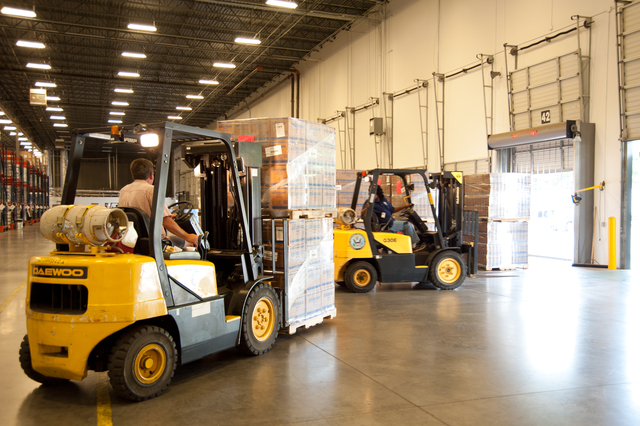
Atlanta, Ga., Aug. 24, 2012 -- These forklift operators are loading meals onto a truck at the Atlanta Distribution Center to be shipped closer to areas that may be impacted by Tropical Storm Isaac. FEMA moves commodities and equipment before the storm arrives to ensure quick delivery after the storm has passed.
As Isaac evolved into a threat to the U.S., FEMA proactively began to deploy initial response resources and teams of people to areas throughout the Gulf region and inland areas that could be potentially impacted by this storm. Local first responders and local and state governments continue to work tirelessly to prevent loss of life and facilitate efforts to quickly restore critical services and facilities. Currently, the entire disaster response team of federal, state, local, and tribal partners, as well as voluntary agencies and the private sector is supporting the process of getting critical emergency supplies to survivors of this disaster.

Hattiesburg, Miss., Aug. 29, 2012 -- FEMA has diesel generators staged at Camp Shelby, Mississippi ready to support any state and local governments that may need them due to impacts from Hurricane Isaac.
FEMA maintains critical commodities on a daily basis – like water, food, blankets, tarps, plastic sheeting, cots and generators - pre-positioned at our distribution centers, strategically located throughout the United States and territories. Before Isaac arrived, FEMA coordinated with U.S. Northern Command to establish Incident Support Bases, which are temporary sites used for positioning resources to be rapidly transferred to state or local points of distribution. These bases were established in Jacksonville, Fla., and Montgomery, Ala., to proactively stage commodities closer to areas potentially affected by Isaac, allowing the federal government to quickly move supplies throughout nearby affected states, should they be needed and requested.
When a disaster like Hurricane Isaac is imminent, or after the state’s governor has requested a disaster declaration, the state may make a request for federal assistance if it believes its supplies may become exhausted. If the state’s request is approved, emergency supplies begin making their way to our state partners and disaster survivors by going to staging areas closer to the affected area. From there, the state takes ownership and full possession of the requested emergency supplies and decides how and where they are distributed to survivors.
There are three standard transfer methods to get critical supplies to survivors:
- Mobile delivery uses vehicles to drive into an affected area and provide commodities. This type of distribution is common in rural areas and where roads are damaged.
- Direct deliveries means coordinating with a specific location, such as a shelter, feeding site, or hospital for the delivery of specific items and quantities and are usually larger in size and more specific in commodity type than what is delivered through mobile delivery.
- Points of Distribution are centralized points where supplies are delivered and the public travels to the site to pick up commodities following a disaster or emergency. The decision to activate, operate, and demobilize a point of distribution is at the discretion of the local government.
As we often point out, FEMA is not the team, but rather part of a team that includes the entire federal family, state, local and tribal officials, the faith-based and non-profit communities, the private sector and most importantly the public. As the details above demonstrate, the effectiveness of getting supplies to disaster survivors depends on all members of the team working closely together. We will continue to work closely with federal, state, local and tribal partners as we continue to assess survivors’ needs in the areas impacted by Isaac.

Add new comment